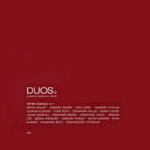|
|
 |
Dusted Reviews
Artist: Peter Kowald Album: Duos 2: Europe America Japan Label: FMP Review date: Feb. 9, 2004 |

|
|
|
 |
Back in 1998 FMP released Duos, a compendium Peter Kowald’s meetings with a multitude of his peers. The cache, culled from a trio of vinyl albums, was indicative of the German bassist’s perigrinary spirit. Subsequent American tours, including one in spring of 2000 that found him criss-crossing the nation in a beat-up jalopy and playing forty-five odd dates further proclaimed him as a man open and willing to break improvisatory bread with virtually any and all comers. This sort of attitude parallels that of Kowald’s old colleague Derek Bailey, but it seems to come from a different ideological root. In Kowald’s case it rises out of a guiding belief in the ‘GlobalVillage’- the notion that music connects all cultures and peoples.
Much has changed in the interim since that initial disc and the release of Duos 2, another strong helping gathered from the same sessions as its predecessor. Kowald’s no longer with us, the victim of a sudden heart attack in the fall of 2002. While ties between improvisors the world over continue to deepen, the political climate around the globe continues to sour. Civil unrest abounds and the village of Kowald’s imagining seems threatened by these upheavals.
In opposition, these various pairings point to a brighter possible future. Each of the eighteen tracks finds Kowald in close company with a different improvisational sparring partner. The roster reads like a summary Who’s Who of American, European and Japanese improv and includes: Evan Parker, Jeanne Lee, Toshinori Kondo, Julius Hemphill, Seizan Matsuda, Diamanda Galas, Conrad Bauer, Butch Morris, Fred Frith, Masahiko Kono, Andrew Cyrille, Floros Floridis, Michihiro Sato, Derek Bailey, Marilyn Mazur, Junko Handa, Yoshisaburo Toyozumi and Tom Cora.
About the only downside to the disc is the necessary terse nature of most of the tracks. Seventy-five minutes may seem like a lengthy tour, but it goes by swiftly. While there’s certainly a gamut of subjective quality, many of the pieces hint tantalizingly at the larger performances from which they originate. Early standouts include “Straight Angels Suite,” the opening reunion with Parker from 87’, which consists of a chain of micro-level bagatelles between screeling soprano and emory board arco bass, and the match-up with Hemphill’s dry jazz-grounded alto on “Balances & Cloves.” Later watermarks arise out of the joining of Kowald’s droning strings with drummer Andrew Cyrille’s incantatory voice and brushwork/snare shots on “Serious Fun II” and interplay with Greek clarinetist Floros Floridis Rembetica-tinged trills on “Maria’s Black.”
The world continues to change, often not for the better, but the underlying truths of Kowald’s teachings remain the same. Societal and cultural borders are human-made. Their perceived rigidities can be unmade. Kowald was an expert at subverting and dismantling distrust and unease born from these constructs. This second helping of duos shows him as a bridge-builder adept at spanning such chasms both gaping and small. It also illustrates directly the degree of esteem held him by his peers.
By Derek Taylor
|







